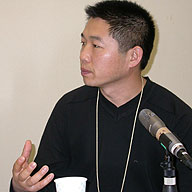An Interview with Wang Bing
Watching this Work, You Can Discover Shared Emotions

Q: The unique sense of distance between the camera and the people in the Tie Xi district is fascinating. What method did you use to build up a trusting relationship with them during the filming?
WB: Personally I didn’t do anything special to earn their trust. For them, my camera didn’t have a special existence. It was like a clock in their house, something they didn’t notice. This happens because I never think of using the camera to violently enter into or distort their lives. I tried just to go along with them, to follow the flow of their lives. With this kind of approach, I think a trusting relationship doesn’t take that much time to build.
Q: How do you yourself interpret this film?
WB: I hope that by having you watch this film, you can discover shared emotions. Meaning that I myself am filming them this time, but while showing the truth of their lives, I am also showing my own feelings. I was following their lives, but at the same time I am layered within the film. So, the people who view the film are trying their hardest to feel their lives as they watch, and are also seeing me there, or perhaps that triggers them to think of something else. I feel like that connects with an emotional exchange between myself and the viewers. I’ve been to various countries, but even if people’s nationality and circumstances are different, everyone is the same when it comes to living a regular life, and living is the same. So, I think people in every country probably interpret this work layered within their own life experiences. Of course people doing film research probably have a their own particular perspective. For ordinary viewers, each person is different, but I’d like people to feel that the really basic elements are not so different.
Q: What are your thoughts about China now, in the midst of change?
WB: Of course, incredible changes are washing over China right now. And these huge changes are putting tremendous pressure on people. Human relations are breaking down, are changing a lot…Regardless of whether people can withstand the pressure, they have no choice but to endure it, and to live. But at the same time, living under pressure makes people think about things anew, explore new ways of living, and I think this might give birth to something that maybe we can call new life.
Q: Do you think that a time is coming when the significance of this film will be understood more deeply and broadly than it is now?
WB: I have a certain level of confidence when it comes to making films, and even if I run into difficulties I find some way to overcome them, but I have no experience when it comes to “showing” the film. So when it comes to this, my personal efforts are totally insufficient. But, I think the work has a life of its own, and the life force of this work is strong. So I think that time will definitely come. I don’t know how much time it will take, but I have a feeling now that this living body called Tie Xi Qu will continue maturing on its own.
(Compiled by Oyama Daisuke)
Interviewers: Oyama Daisuke, Mikoshiba Kazuo / Interpreter: Akiyama Tamako
Photography: Abe Shingo / Video: Matsunaga Yoshiyuki / 2003-10-15
